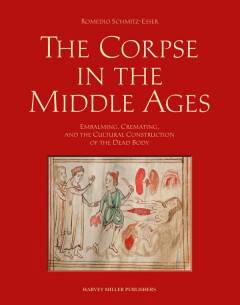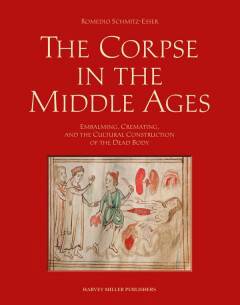
- Afhalen na 1 uur in een winkel met voorraad
- Gratis thuislevering in België vanaf € 30
- Ruim aanbod met 7 miljoen producten
- Afhalen na 1 uur in een winkel met voorraad
- Gratis thuislevering in België vanaf € 30
- Ruim aanbod met 7 miljoen producten
Zoeken
The Corpse in the Middle Ages
Embalming, Cremating, and the Cultural Construction of the Dead Body
Romedio Schmitz-Esser
Hardcover | Engels
€ 318,95
+ 637 punten
Omschrijving
To what extent are the dead truly dead? In medieval society, corpses were assigned special functions and meanings in several different ways. They were still present in the daily life of the family of the deceased, and could even play active roles in the life of the community. Taking the materiality of death as a point of departure, this book comprehensively examines the conservation, burial and destruction of the corpse in its specific historical context. A complex and ambivalent treatment of the dead body emerges, one which necessarily confronts established modern perspectives on death. New scientific methods have enabled archaeologists to understand the remains of the dead as valuable source material. This book contextualizes the resulting insights for the first time in an interdisciplinary framework, considering their place in the broader picture drawn by the written sources of this period, ranging from canon law and hagiography to medieval literature and historiography. It soon becomes obvious that the dead body is more than a physical object, since its existence only becomes relevant in the cultural setting it is perceived in. In analogy to the findings for the living body in gender studies, the corpse too, can best be understood as constructed. Ultimately, the dead body is shaped by society, i.e. the living. This book examines the mechanisms by which this cultural construction of the body took place in medieval Europe. The result is a fascinating story that leads deep into medieval theories and social practices, into the discourses of the time and the daily life experiences during this epoch.
Specificaties
Betrokkenen
- Auteur(s):
- Vertaler(s):
- Uitgeverij:
Inhoud
- Aantal bladzijden:
- 780
- Taal:
- Engels
Eigenschappen
- Productcode (EAN):
- 9781909400870
- Verschijningsdatum:
- 18/02/2021
- Uitvoering:
- Hardcover
- Formaat:
- Genaaid
- Afmetingen:
- 226 mm x 284 mm
- Gewicht:
- 3152 g

Alleen bij Standaard Boekhandel
+ 637 punten op je klantenkaart van Standaard Boekhandel
Beoordelingen
We publiceren alleen reviews die voldoen aan de voorwaarden voor reviews. Bekijk onze voorwaarden voor reviews.











